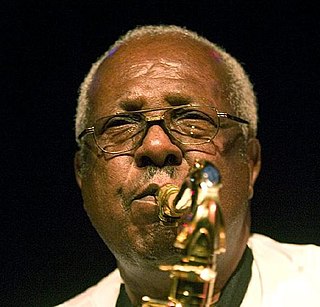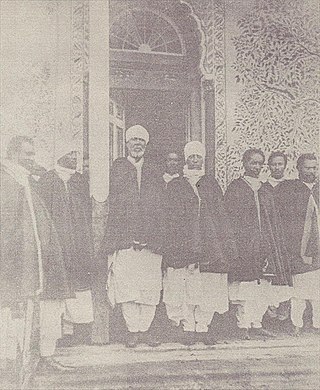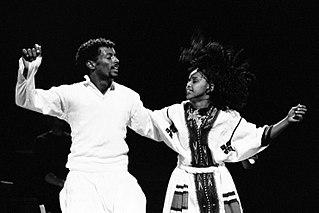Related Research Articles
Ethiopian music is a term that can mean any music of Ethiopian origin, however, often it is applied to a genre, a distinct modal system that is pentatonic, with characteristically long intervals between some notes.

Tilahun Gessesse was an Ethiopian singer regarded as one of the most popular Ethiopian artist of the 20th century. Noted by his tenor voice, he was nicknamed "The Voice" during his country's "Golden Age" in the 1960s. Tilahun was an eminent singer whose works are attributed legacy to Ethiopian music. Besides his popularity, he raised money for aid during the famines of the 1970s and 1980s and earned the affection of the nation, being awarded a doctorate degree by the Addis Ababa University and also winning a lifetime achievement award from the Ethiopian Fine Art and Mass Media Prize Trust.
Éthiopiques is a series of compact discs featuring Ethiopian singers and musicians. Many of the CDs compile songs from various singles and albums that Amha Records, Kaifa Records and Philips-Ethiopia released during the 1960s and 1970s in Ethiopia. Prominent singers and musicians from this era appearing on Éthiopiques releases include Alemayehu Eshete, Asnaketch Worku, Mahmoud Ahmed, Mulatu Astatke and Tilahun Gessesse. However, some other releases contain new recordings.

The culture of Ethiopia is diverse and generally structured along ethnolinguistic lines. The country's Oromo-speaking majority adhere to an amalgamation of traditions that were developed independently and through interaction with neighboring and far away civilizations, including other parts of Kenya, Sudan, Egypt, and other parts in East Africa. By contrast, the nation's Nilotic communities and other ethnolinguistic minorities tend to practice customs more closely linked with South Sudan and/or the African Great Lakes region.

Mulatu Astatke is an Ethiopian musician and arranger considered as the father of "Ethio-jazz".

Mahmoud Ahmed is an Ethiopian singer. He gained great popularity in Ethiopia in the 1970s and among the Ethiopian diaspora in the 1980s, before rising to international fame with African music fans in Europe and the Americas.

Saint George Sports Club, otherwise known as Kidus Giorgis, is a professional football club based in Addis Ababa, Ethiopia. They play in the top division of Ethiopian football, the Ethiopian Premier League. Founded in 1935, the club was the first in Ethiopia and was established as a symbol of Ethiopian nationalism and resistance against the occupying forces of fascist Italy.

Alemu Aga is an Ethiopian musician, singer, and master of the Begena.
Russ Gershon is an American saxophonist, composer, arranger, and founder of the Either/Orchestra in Massachusetts in 1985.
The Either/Orchestra (E/O) is a jazz group formed by Russ Gershon in Cambridge, Massachusetts, US, in 1985. E/O is configured as a "small big band", with three saxes, two trumpets and one or two trombones. E/O's is characterized by a heavier and more orchestrated sound than that of a smaller jazz combo, but remains more streamlined and improvisation-oriented than most big bands.

Getatchew Mekurya was an Ethiopian jazz saxophonist.
Walias Band were an Ethiopian jazz and funk band active from the early 1970s until the early 1990s. Formed by members of the Venus Band, Walias backed up many prominent singers with a hard polyrhythmic funk sound influenced by western artists like King Curtis, Junior Walker and Maceo Parker. In 1977 they recorded one of the few albums of Ethiopian instrumental music in collaboration with vibraphonist Mulatu Astatke, whose role as a bandleader and composer was also a major influence on Ethiopian popular music.
Korra Garra is an Ethiopian writer, an expert in the Konso language and culture, and an authority on Konso agriculture. He is known for his presentations on the importance of the Moringa tree in the Konso economy and culture.

Ras BitwodedTessema Nadew horse name Abba Qamaw was an Ethiopian military commander and a government official who on 28 October 1909 was proclaimed as Ethiopia's future Balemulu Enderase to Lij Iyasu, upon the latter's appointment as heir to the throne by Emperor Menelik II. He died in 1911, predeceasing Menelik and thus never assuming that office. He previously served as governor of Illubabor Province, the campaign of re-conquest for which he had led, and fought in the Battle of Adwa.

LijSeifu Mikael was an Ethiopian noble, member of the Solomonic dynasty, belonging to the aristocratic Amhara family from Ankober Shewa. He was the grandson of Dejazmatch Mekuria Tesfaye of Menz, a prominent general and a cousin of Emperor Menelik II of Ethiopia as a grandson of King Sahle Sellasie of Shewa. Lij Seifu, a public figure, educated in Paris at Sorbonne; he was one of the first few earlier members of the royalty who started paying salaries to their household servants advocating freedom of slaves and an avid supporter of Ras Tafari in his bid to become an emperor of Ethiopia. He served as Ethiopia's minister to France and Germany while he lived in Europe in the 1910s, Ethiopia's Consul General to Eritrea from 1921 to 1925 and Governor of several districts till the eve of the fascist invasion of Ethiopia.

Zeritu Kebede is an Ethiopian singer, songwriter and actress. A prominent figure in modern Ethiopian music, her songs often incorporate rock and gospel music.

Fendika is an Ethiopian music group based in Addis Ababa. Led by dancer/choreographer Melaku Belay, they operate a venue, tour, record, and perform under the name Fendika.
Getachew Kassa is an Ethiopian singer and percussionist. He was famous at the height of 1960s and 1970s after hiring to the country's famous clubs, the Sombrino and Axum Hall, which made him eligible to professional skills.
Francis Falceto is a contemporary French musicologist and music producer, specialising in World music and in particular music of Ethiopia which he helped propagate internationally from 1986 onwards.
The Ethiopian Golden Age of Music was an era of Ethiopian music that began around the 1960s to 1970s, until the Derg regime progressively diminished its presence through politically motivated persecutions and retributions against musicians and companies, which left many to self-imposed exile to North America and Europe. Several artists and musical companies, as well as recording groups, emerged to produce their own singles and albums; the first being Amha Records, and Philips Records, Ethiopia Records and Kaifa Records, which is primarily based in Addis Ababa.
References
- ↑ Uhlig, 2006. Pages 404-407.
- ↑ The Book Sem Ena Worqu Tessema Eshete by Yidnekatchew Tessema, 1992
- ↑ Uhlig, 2006. Pages 404-407.
- ↑ Ethiopians: Ato Yidnekachew Tessema Retrieved 22 January 2012
- ↑ Yidnekatchew Tessema. Sem Ena Worqu Tessema Eshete. 1992.
- ↑ Azmari Tessema Eshete CD launch. 20 September 2010, Goethe Institut Addis Abeba. (http://www.goethe.de). Retrieved 22 January 2012
- ↑ Azmari Tessema Eshete. Ethiopiques 27: Centennial of the First Ethiopian. Buda Records, 2011. (34 tracks)
- ↑ Ethiopiques 27 has unresolved legal issues with Tadele Yidnekatchew Tessema
- ↑ Ethiopiques 27 has unresolved legal issues with Tadele Yidnekatchew Tessema